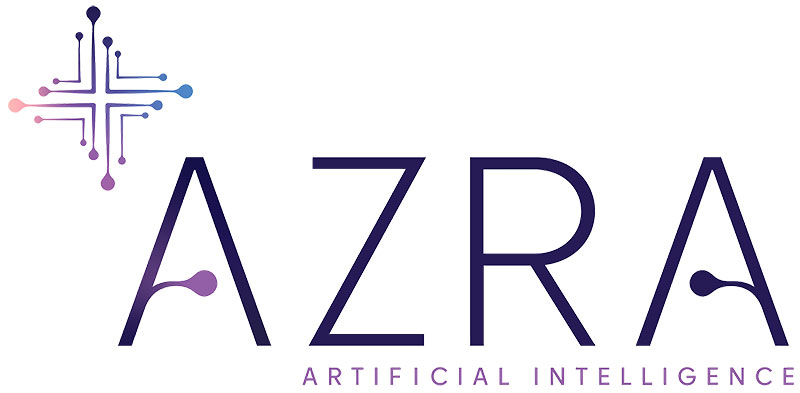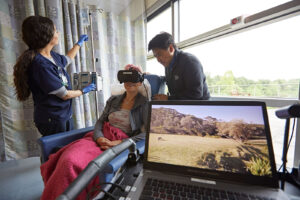Artificial intelligence (AI) has integrated itself into many aspects of everyday life — from cybersecurity; to online shopping chatbots; to maps and navigation; to Siri, the iPhone’s tiny personal assistant that lives in your pocket. AI uses data to make decisions or predictions, and this concept is gaining popularity in cancer care, as oncologists and researchers explore the many ways AI can help diagnose and treat cancer.
According to the National Cancer Institute (NCI), AI has been on the rise in assisting doctors with cancer imaging, answering questions like: Is it cancer or a harmless lump? If it is cancer, how fast is it growing? How far has it spread? Is it growing back after treatment? The NCI also notes that AI can help “improve the speed, accuracy and reliability with which doctors answer those questions.”
With that, cW has rounded up some new and innovative AI technologies that are providing hope for patients, doctors and hospitals everywhere.

Avenda Health iQuest and FocalPoint
Brittany Berry-Pusey, PhD, cofounder and chief operating officer of Avenda Health, started the health tech company to transform the standard of care for prostate cancer treatment by using AI. According to the American Cancer Society, about one in eight men will be diagnosed with prostate cancer during his lifetime. “Our mission is to personalize prostate cancer treatments to provide improved quality of life and longevity,” Berry-Pusey says.
Avenda Health developed iQuest, an AI-based software designed to help identify where the cancer is in an individual’s prostate by using a patient’s clinical data to map the extent of the disease and simulate treatment options. “There hasn’t been much advancement in this space, because it is a challenging disease to identify with imaging alone,” explains Berry-Pusey. “iQuest gives providers a much clearer view of where the cancer is.”
Along with iQuest, Avenda Health also developed FocalPoint, which is a laser-based ablation system that iQuest powers. “With the knowledge from iQuest on where the cancer is, we can use FocalPoint to fully ablate the localized tumor in an office-based setting with just local anesthesia,” says Berry-Pusey.
Essentially, iQuest combines patient-specific data and determines the probability of the cancer in patients. It then visualizes the location and extent of prostate cancer to aid patients and their doctors in making well-informed decisions about next steps. Then, FocalPoint delivers targeted focal ablation treatment to the affected area, which minimizes the impact to healthy tissue while also preserving the quality of life. Because this treatment option is less invasive than surgery — requiring only a laser needle and thermal optical sensor — patients experience minimal to no downtime.
“The traditional approach to prostate cancer treatment leads to urinary and sexual dysfunction in more than half of patients,” Berry-Pusey says. “This is because prostate cancer is typically treated as a whole-gland disease, removing or radiating the entire prostate and damaging critical structures, even though the tumor is usually quite localized.” With AI, Avenda Health is able to provide more personalized care while preserving the patient’s quality of life.
In August 2022, Avenda Health announced it received an investigational device exemption (IDE) from the FDA for its ablation system, FocalPoint. This will allow for Avenda Health to combine the two technologies in a randomized controlled trial. “We will begin recruiting patients for a large clinical study that will show FocalPoint powered by iQuest is a superior form of treatment for localized prostate cancer compared to the standard of care,” says Berry-Pusey.
Preston Sprenkle, MD, associate professor of urology at Yale University and director of Yale New Haven Hospital’s prostate cancer focal ablation program, believes this new software has the potential to dramatically change prostate cancer care.
“Currently, most men have whole prostate treatment because we are unable to reliably predict the extent of prostate cancer within the prostate,” says Sprenkle. Sprenkle notes that MRI-guided biopsies of the prostate have improved the ability to treat prostate cancer, but without the help of AI, physicians are still only estimating where the cancer is located.
“The iQuest software is the most accurate way I have seen to visualize where cancer is in the prostate and the extent of this disease. [U]sing this technology, we can design our treatment zones with more confidence and precision, likely resulting in preservation of a greater number of important structures,” Sprenkle says.
Berry-Pusey believes that Avenda Health’s AI platforms represent a major shift for prostate cancer care. “Our AI algorithms will help physicians be the best they can be,” she says. “With AI, we finally have a path forward where patients will no longer have to sacrifice quality of life for length of life,” she says.

Azra AI
Azra AI is an algorithm that analyzes, identifies and classifies oncology patients by cancer type in real time. This technology helps medical teams identify suspicious findings in patients that could lead to an earlier diagnosis and, in turn, allows for earlier interventions that increase the probability of a patient’s cancer entering remission.
“Prior to using [Azra AI], we did not have the technology that assisted nurse navigators in cancer treatment, and our team relied on reviewing schedules and waiting on direct referrals to help diagnose patients,” says Kristina Rua, an oncology-certified nurse and former director of oncology navigation services in the East Florida division of HCA Healthcare. “There were many challenges because of this, including the [number] of patients that were missed and unable to be tracked, as well as the amount of time it took to treat patients and help them through the care continuum.”
Rua explains how Azra AI assisted her team with many facets of the patient-care system, including the ability to create a benchmark of how many patients were being diagnosed, where they were being diagnosed and who was coming through their system. As an oncology nurse and navigator, Rua says it’s her job to ensure patients are accessing care in a timely manner. The AI has let Rua and her team treat patients faster, without having to wait on referrals, and has given her quick access to the specific diagnoses of each person.
Azra AI also helped advance breast cancer detection and diagnosis, where sometimes biopsies are ordered by an OB-GYN or primary care physician instead of a breast surgeon. “Without [AI], patient care can be delayed due to the infrastructure of care, such as scheduling conflicts and the number of experts that are notified first,” says Rua. “Within hours of testing and using the AI technology, a breast navigator can identify a positive diagnosis and notify all parties so that care is not delayed and is taken care of sooner rather than later.”
While Rua acknowledges that using AI to help with cancer detection and prevention is nothing new, there is still much room for growth on how it can be used in other areas.“With the amount of growth in AI and cancer, we’ll start to see it be used in precision medicine in the future,” Rua says.
“With AI, we finally have a path forward where patients will no longer have to sacrifice quality of life for length of life.”
Fujitsu Research Knowledge Database
Cancer genome therapy is another area that has been improving outcomes in cancer care, representing a new wave of treatment options for cancer warriors, such as immunotherapy, oncolytic therapy and gene transfer. As noted by the National Library of Medicine, the field of cancer gene therapy is rapidly maturing and will no doubt be a permanent part of cancer therapeutics.
In terms of AI, Fujitsu Laboratories is collaborating with the Institute of Medical Science at the University of Tokyo (IMSUT) to create a knowledge database using AI-powered language processing technology. Oftentimes, doctors will predict the physical makeup, disease stage, drug response and side effects of cancer treatment, but it takes them a considerable amount of time to analyze medical research papers. Fujitsu and IMSUT’s knowledge database, filled with over 800,000 medical papers, cuts that time in half so doctors are able to treat patients faster and more effectively.
Fujitsu is also partnering with Aichi Cancer Center to explore how AI can make it faster to analyze cancer gene panel testing results and the connections between genetic mutations of cancer patients and diseases.
“In recent years, it has become possible to obtain large amounts of genomic information from patients, but only a small fraction of this information can be used for treatment,” says Dr. Masaru Fuji, a project manager for Fujitsu. “This makes research into the use of unknown genomic information in medicine an important priority for researchers.”
This is why Fujitsu wants to utilize AI to help scientists and physicians access medical information from one big database. “Since AI can [also] predict relevant information for unknown genomic information that is not directly described in the training data, it is expected that physicians may be able to consider treatment policies for patients for whom it has not been possible to predict treatment methods in the past,” Fuji explains.
Genome therapy is still a relatively new form of treatment, and Fuji predicts that once the number of genomic medicine use cases and resulting data increases, healthcare professionals will be able to spend less time finding relevant medical information and files, and will then be able to help more patients, more quickly.
“This ability to process large volumes of data coupled with explainable AI that outlines the reasons behind the treatment decisions sets Fujitsu’s approach apart from others in the industry,” Fuji says. “[We] offer a possible solution to the so-called ‘black box phenomenon’ in AI and machine learning applications,” says Fuji.
Most technology systems don’t allow you to see their software’s processes, or inner workings. They only allow you to see the input and the output. Fujitsu wants to change this by revealing the why and how of the AI, so that it can be adopted to support healthcare professionals worldwide.

Varian Ethos Therapy System
Karmanos Cancer Center in Detroit has a new AI system called the Varian Ethos Therapy System, which aims to increase the capability, flexibility and efficiency of radiation therapy, delivering treatments in a 15- to 30-minute patient timeslot.
“Historically, standard radiation treatments follow a rigid plan that is set in place at the beginning of treatment,” explains Dr. Adrian Nalichowski, PhD, DABR, lead medical physicist at Karmanos. “While we can account for changes in the location of the anatomy throughout the course of treatment, standard treatments do not allow us to account for changes in the shape of the target tumor.”
Adaptive therapy, used to increase the efficiency of radiation therapy, monitors physiological changes in patients’ anatomy as well as tumor response between treatments, and can adjust the original plan to better target the cancer throughout the course of treatment. This is due to using AI to help create an updated outline of the tumor and the surrounding healthy organs to recompute a new treatment plan, says Nalichowski. And this all happens in a matter of minutes.
With Ethos therapy, the patient is imaged before each treatment session. Algorithms use data from real patients and anatomical structures outlined by human anatomy experts, and Ethos therapy is able to create a new treatment plan that integrates the patient’s current anatomy. After careful evaluation of this new treatment plan by physicians and doctors, the plan can then be used to treat the patient more accurately, as it accounts for changes in the normal tissue and target structures of the patient.
Nalichowski says that Ethos therapy is best suited for patients with cancers in the pelvic area and lower abdomen, including prostate cancer, colorectal cancer, cervical and uterine cancers, but he also notes it “can be utilized for a variety of other cancer types for which we may anticipate changes in the shape of the target between treatments or over the course of radiation therapy.”
Nalichowski says some patients may feel apprehensive about participating in a treatment that is headed by AI instead of humans. However, physicians are there every step of the way. “Because this technology is driven by artificial intelligence, it requires strict oversight by the radiation therapy team,” says Nalichowski. “Each treatment and its associated new plan is evaluated in real time by a radiation oncologist and medical physicist immediately before the treatment.” Nalichowski says the goal of Ethos therapy is to better target the tumor, reduce the dose of radiation to healthy tissue and potentially improve the overall outcome.
How is this technology creating a better future for cancer patients? Among other benefits, the difference in time is a big factor, Nalichowski says, as Ethos therapy is able to create a personalized treatment plan tailored to the patient in a fraction of the time it would take a human. “[This] enhances our ability to deliver the most personalized and accurate treatment,” says Nalichowski.
The Bigger Picture:
AI isn’t just creating better treatment experiences for today’s cancer patients, it is also shaping the future of cancer. “AI in oncology is still in its infancy, both in medicine and cancer care, though it is rapidly developing,” says Michael Chung, MD, medical director of IT at The Oncology Institute (TOI).
TOI uses technology in almost every facet of patient care, from accessing electronic medical records and having virtual visits with patients, to prescribing medications online and viewing patient scans and body imaging. Electronic medical records allow oncologists to quickly determine the appropriate treatments and treatment dosages and evaluate for potential medication interactions.
A cancer diagnosis often indicates there is a genetic mutation in the body, and Chung notes that through blood and tissue sampling, it is possible to discover if a patient has potentially actionable mutations, which are “genetic aberrations in a patient’s tumor that are targetable with an available anticancer treatment or are the targets of novel therapeutics in development,” according to the Hematology/Oncology Pharmacy Association.
Essentially, AI greatly aids personalized medicine. “Many next-generation sequencing studies already utilize computer algorithms that suggest FDA-approved therapies based on mutation presence,” Chung says. “They can also estimate how a patient will respond to the treatments, or even go as far as to suggest enrollment in a nearby clinical trial.” Instead of treatments that are universally based, with variations depending on age, gender or type of cancer, AI has made it possible for a more individualized and genetics-focused treatment approach.
“As oncologists and clinicians, we often refer to expert consensus and evidence-based medicine to guide our treatment choices,” explains Chung. “In the future, we may seamlessly use AI to guide all our clinical choices throughout the patient’s entire cancer journey. This could very well lead to overall improved patient outcomes and patient satisfaction.”
However, while there seems to be much innovation at the forefront of AI, Chung points out some challenges that we still face when relying on computers and algorithms, rather than humans. “Physicians still document a patient encounter based on a narrative note,” says Chung. He mentions that much of physicians’ documentation is qualitative rather than quantitative. “A good note will still contain all relevant information, but a narrative makes it difficult for AI learning algorithms to analyze, as algorithms would prefer analyzing numbers over descriptive words.”
In the future, we may seamlessly use AI to guide all our clinical choices throughout the patient's entire cancer journey. This could very well lead to overall improved patient outcomes and patient satisfaction.
Chung also understands the challenge of accepting technology in medicine. There will always be differing opinions on whether integrating AI will make things easier for both the doctor and the patient. As well, less human interaction in a care setting could negatively affect treatment experiences, as algorithms and data are not able to express empathy, which is crucial for some patients. It is a dilemma for many, but such is the nature of this rapidly growing field. “In the end, technology will always advance faster than humans can evolve,” Chung says. “We will just have to adapt.”







